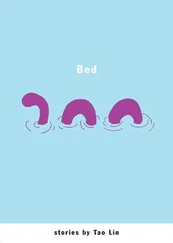One night, standing in the doorway of his parents’ bedroom, when his father was on a months-long business trip, crying while shouting at his mother, who was supine in bed, in the dark, Paul heard her softly and steadily crying, with her blanket up to her chin in a way that seemed child-like. Paul stopped shouting and stood sobbing quietly, dimly aware, as his face twitched and trembled, that he felt intensely embarrassed of himself from the perspective of any person, except his mother, he had ever met. He said he didn’t know what he was talking about, or what he should do, that he was sorry and didn’t want to complain or blame other people anymore, and felt an ambiguous relief, to have reached the end of a thing without resolution and, having tried hard, feeling allowed — and ready — to resign. He didn’t stop blaming his mother, after that, but gradually they fought less — and, after each fight, when he would revert to his belief about discipline, he would apologize and reiterate he didn’t want to blame anyone or complain — and, by the last month of senior year, had mostly stopped fighting.
On one of Paul’s last days of high school he and Lori were both getting rides home from Hunter, who due to a difficulty in refusing requests from people who could see him — in elementary/middle school, whenever a mutual friend rang his doorbell, he and Paul would pretend no one was home— sometimes spent ninety minutes driving classmates home after school. The past eight years, since Lori kissed Paul on the cheek, they’d spoken maybe three times (the day after they rollerbladed together she had begun hanging out with a boy with a “rattail” hairstyle), and the most intimate Paul had been with another girl was a ten-minute conversation, at an “away” high school football game, with another percussionist.
Lori repeatedly asked Paul why he wouldn’t speak and, not receiving an answer, began provoking Paul to “say anything,” seeming as committed to eliciting a response as Paul was to not responding. Lori was loudly asking, with genuine and undistracted and bemused curiosity, which Paul felt affection toward and admired, as he stared away from her, out his window, why he couldn’t speak — and if he could just “make any noise”—when Hunter, who’d been talking to someone in the front passenger seat, sort of forced Lori to stop by aggressively asking about her current boyfriend. As he had consistently, the past eight to ten years, Paul felt endeared by Hunter, who used to be an equal, but now — and for the past three or four years — was like an overworked stepfather or sensitive uncle to Paul, the mentally disabled stepson or silent, troubling nephew.
Paul hadn’t seen Laura since she slept over, five days ago, when he brought a mix CD and Ambien to her room, which was more than half occupied by a full-size bed. She offered him red wine she was drinking from a wineglass and typed “sex tiger woods” into Google and clicked dlisted.com. Adjacent to a photo of Tiger Woods, smiling on a golf course, were blocks of text, in which “Ambien sex haze” was in bold around ten times.
Laura typed “ambient” into Google.
“No,” said Paul grinning. “That’s the music, delete the t .”
Laura laughed and typed “ambien and alcohol and klonopin and” and grinned at Paul and, though she had a Klonopin prescription, Paul knew, and was probably on Klonopin, said “just kidding” and deleted all but “ambien and alcohol.” Every result, it seemed, warned strongly against combining Ambien and alcohol, but Laura said she drank “a lot,” so it would be okay. Paul crawled onto her bed and touched her cat Jeffrey and, after a vague amount of time, became aware of a slight blurriness to his vision, like he was seeing from two perspectives in time, milliseconds apart, and that he felt vaguely sleepy and not nervous. He asked if Laura could turn off the light, which seemed uncomfortably bright. He felt confused, to some degree, by everything, but at a delay, as if continuously realizing past confusions, which could no longer be resolved, so were not problems. They seemed to be watching a foreign movie off her computer, then Paul noticed the light was on and that they were lying against a mound of blankets, kissing lazily, with eyes closed and long pauses, maybe sometimes asleep. He became aware of his mix CD, of some of his favorite songs, sounding unpleasantly, almost nightmarishly, noise-like. Paul realized they were trying to undo his belt and weakly imagined what would happen if his jeans were removed and heard Laura say “we just met” from what seemed like a nearby, inaccessible distance and wondered if he was asleep, or dreaming, but knew he was awake, because he was moving physically. He was trying to remove Laura’s clothing. He felt like he was trying to remove the surface of a glass bottle by pawing at it with oven mitts. He expressed confusion and Laura said “it’s just a skirt. . and tights” and stopped moving completely, it seemed, as Paul continued touching her strange outfit with hands that felt glossy and fingerless, suspecting at one point, with some sarcasm, that she was wearing a corset.
“It’s been two hours, I think,” said Paul after staring at his phone around ten seconds. “Jesus,” he said, and sneezed.
Entering Lucie’s party, an hour and a half later, Paul felt like if he wasn’t careful he would fall in an out-of-control, top-heavy manner toward whomever he was greeting and hurt himself and multiple others by reflexively grabbing people and pulling them down with him in a continuing effort to remain standing. He realized he might be unconsciously hunching his back, to be nearer the floor, when Lucie, though four or five inches shorter, appeared to be above him as she thanked him for linking her magazine on his blog. Paul introduced Lucie and other people to Laura by saying “this is Laura” a few times without looking at anyone’s face, while moving toward areas with less people. “Hey,” said Paul, as he passed Mitch in a crowded space, and mumbled something about “going somewhere,” which in combination with a peremptory nodding was meant to convey they would definitely talk at length, later tonight, since they hadn’t seen each other in a long time — months, maybe.
In an empty kitchen, a few seconds later, Paul realized Mitch, who worked for Zipcar, had driven him and Laura — and others — to this party. Paul stared into a refrigerator, bent at his waist, waiting for himself, it seemed, to think or do something. “Trying to choose two beers,” he thought after a vague amount of time, and chose two at random, then found Laura and went with her through a window, onto a fourth-story roof, where they passed a shadowy area, emanating the language-y noises and phantom heat of four to six people, to a higher area, where they were alone. Paul, dangling his legs briefly off the building, scooted backward, passively cooperative, as a distracted-seeming Laura pulled him away from the edge. They sat facing hundreds of the same type of four-story building, the expanse of which, in most directions, darkened dramatically, creating an illusion that one could see the Earth’s curvature, until blurring, in the distance, into a texture. Sometimes, looking at a city, especially a gray or brown one, at night, Paul would intuitively view it as a small and irreducible thing that arrived one summer and rapidly grew, showing patterns of color on its expanding surface, then was discolored by autumn and removed of its exterior and deadened by winter, in preparation for regrowth, in spring, but was unable, in its form, to enter the natural cycle, so continued growing, in a manner as if faceless and skinless, through summer, autumn, etc., less in belligerence or tyranny, or with some abstruse knowledge of its own rightness, than as a stranded thing, sightless and uninstructed, with an objectless sort of yearning. Seeing the streets and bridges and sidewalks, while living inside a building, locked in a room, one could forget that it was all a single, alien, seeking entity.
Читать дальше












